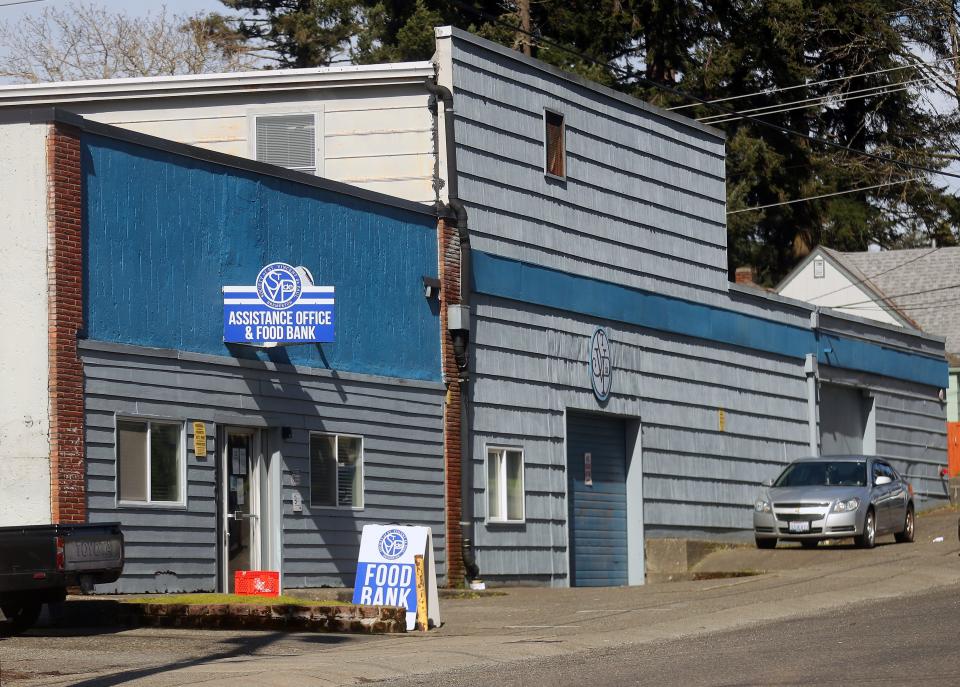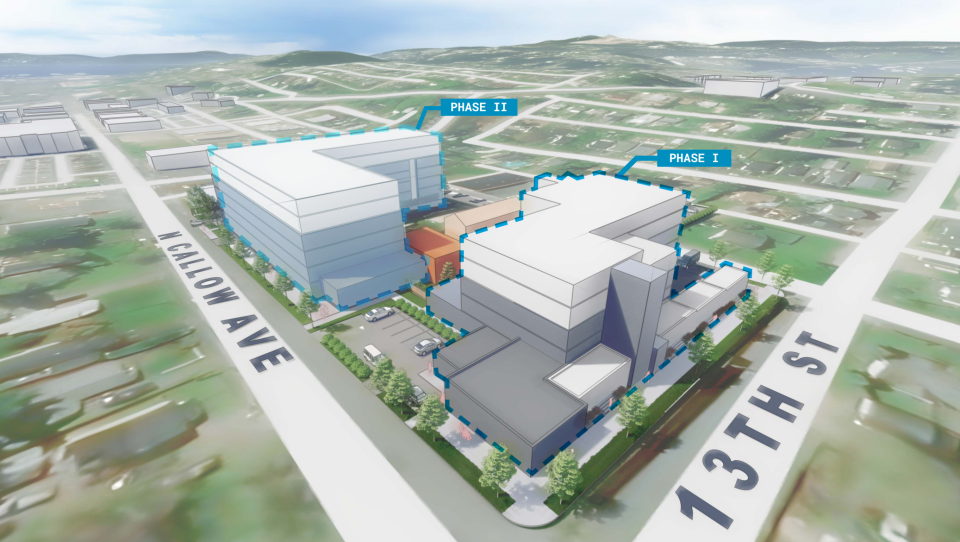Multi-million St. Vincent de Paul redevelopment to add housing, services in Bremerton
Editor's note: This story has been updated to correct an error. The Stella Maris women's shelter that St. Vincent de Paul operates is not part of the demolition project and will continue to operate.
Bringing the different services of Bremerton’s St. Vincent de Paul into alignment has been executive director Joe Crain’s mission since he arrived at the social services provider in 2019. The 80-year-old Catholic organization served nearly 29,000 clients last year, housed 198 people at its women’s shelter and distributed 7,200 articles of clothing from its thrift store and 700,000 pounds from its food bank, Crain reported.
But operations have always functioned "disparately" between the aging series of buildings along Bremerton's Callow Avenue that St. Vinny's calls home.
Now, St. Vincent de Paul is gearing up to synthesize and expand its operations in a nearly $115 million, two-phase redevelopment that will create a resource center with wraparound services and over 140 units of housing. The agency's longtime thrift store was moved from the site to a location in East Bremerton in 2023, and plans next call for the demolition of the assistance center, food bank, and two other small residences to make way for a campus that will completely transform a block between Callow and Wycoff just north of 11th Street.

Breaking the cycle of poverty… and beyond
The first phase of redevelopment, at a cost of about $40 million, will take the form of a brand new four-story building with a resource center on the first floor and three stories of housing on top and will likely break ground in 2026.
For a total of 38 units, 19 will be made permanent supportive housing and the other 19 will be two-year programmatic transitional housing, all of which will be geared towards women and children, Crain said. Nine of the 19 transitional housing units will be reserved for DOC voucher housing for formerly incarcerated people to prevent recidivism, and some of the units will be two bedrooms to support larger families.
The organization’s Stella Maris women’s shelter will also expand its 22-bed capacity in its current location with 10 additional beds to serve larger families as well.
“Helping folks out of what could be a potentially abusive situation and giving them a chance to get away from a bad situation and get their feet under them is just a wonderful project, much needed in our community, serving… the most vulnerable in our city,” said Bremerton Mayor Greg Wheeler, who has cast his full support behind the project and will endorse the organization’s future campaigns for funding.
“If we can impact… a child and get them and their family stabilized and on a path of independent, successful, positive outcomes, then we're going to be able to catch them before they fall into homelessness and poverty,” said Bremerton Housing Authority Executive Director Jill Stanton. “Really concentrating on women with children is just a fantastic and crucial way to really stop the cycle of trauma that can happen generationally.”
In the planned resource center, visitors will be able to access an expansion of St. Vincent de Paul’s case management offices beyond a waiting room lobby, Crain said. The organization has one case manager now, but Crain hopes to have three to five in the new space with a flex-office for other licensed professionals from agencies like Kitsap Public Health, who might be able to hold clinics on certain days.
“It's just a huge benefit to the people that we're trying to serve to have onsite wraparound services available and to be able to be housed at the same time and in a safe environment,” Stanton said. “It's crucially important because, generally speaking, the people that we are serving have barriers and have come out of trauma and they need those support services to really heal, stabilize, and be successful in the future.”
More: St. Vincent de Paul thrift store moving to larger Wheaton Way location
Phase one will also rehouse St. Vincent de Paul’s food pantry in a warehouse on its current campus with a new “self-shopping” distribution model similar to North Kitsap Fishline food bank in Poulsbo, while utilizing two walk-in freezers donated from the old Harrison Hospital, Crain said.
The resource center will also feature laundry machines, charging stations, a security office and a training kitchen for those in the transitional housing program and Stella Maris shelter to take classes on meal planning and nutrition.
And pending an agreement with a local animal shelter, the new campus may be able to offer five kennels to house pets for people who could come to stay in the Stella Maris house, as having a pet can often be a barrier to shelter for unhoused people. Owners will be able to access their animals and take them on a walk, Crain said.

Influx of affordable housing on city's west side
In phase two of the project, projected to cost about $75 million, St. Vincent de Paul will erect a six-story apartment building with 110 units of affordable housing, starting in 2027 or 2028, Crain said. The organization is coordinating with Olympic College to reserve an as-of-yet undecided portion of the units for student housing.
St. Vincent de Paul is looking to expand its collaboration with Olympic College and potentially provide internship opportunities for students to work with staff specializing in social work, housing, healthcare and more. The organization currently offers its employees tuition assistance in pursuing an associates degree at Olympic College and is working with the school to provide certification for a soft skills development program called Elevate.
Phase two will also see the establishment of a small early childhood development center and childcare facility on the ground floor of the apartment building, in collaboration with the YMCA, Crain said, aimed in part to fill a need for workers at the nearby Naval Base Kitsap or Puget Sound Naval Shipyard.
The complete design of phase two isn’t set in stone, as St. Vincent de Paul works to close on a couple parcels around its property. Acquiring the parcels will allow the organization to expand courtyard space on the project and extend its structures, Crain said. The agency has not completed fundraising for the project's entire cost, and will launch a community campaign as well as continue to seek grant opportunities, Crain said.
Uniting agencies across city, county
By including housing, food, clothing, education and other services, the St. Vincent de Paul redevelopment has been a product of community collaboration from the very start.
In early discussion the project gave birth to the Kitsap County Affordable Housing Taskforce, a group leading the way on Bremerton’s hybrid homeless shelter solution project, and assisted in acquiring housing projects like Mills Crossing and Evergreen Brightstart as public assets.
“The passion (Crain) had around it matched the passion that some of the other leaders had around this issue, but we had never brought that passion together,” Stanton said. “When we held those meetings, it did ignite something in all of us. We were all trying to do this on our own, and it's hard, but if we come together around a common goal to address a crisis, we can accomplish something big.”
The redevelopment has support from the affordable housing taskforce and outside agencies that plan to collaborate, including Kitsap Mental Health Services, Kitsap Public Health, the Bremerton Housing Authority, Kitsap Community Resources, Olympic College, the Charleston Business District, the YMCA, Kitsap Economic Development Alliance, Kitsap Bank and the City of Bremerton.
KCR will refer homeless guests into St. Vincent de Paul’s shelter through their Housing Solutions Center, KMHS will provide guidance for the project’s permanent supportive housing and the BHA will likely provide project-based vouchers for subsidized housing, to name examples of how partnerships may function.
“Right now, we have about 200 fully-funded vouchers and we're trying to get those out to people, but the people still need an actual unit to use their voucher,” Stanton said. “And so with the St. Vincent de Paul project providing so many units, it'll be a huge influx of available units for our voucher holders.”
Because the BHA and St. Vincent de Paul work together with many of the same people, case managers will be able to more quickly move guests from the Stella Maris shelter into sustainable housing with the vouchers, freeing up space in the emergency shelter which is desperately needed in the city, Crain said.
Breathing life into a West Bremerton neighborhood
The benefits of the redevelopment won’t be confined to the new campus's boundaries, Crain said. The multi-service complex may also spill out into the surrounding area, just when it needs it most.
“It really brings some life into this community,” Crain said.
Jim Cline, vice president of the Charleston Business District, believes the project will influence a larger revitalization along Callow Avenue. Not only will the revamped campus provide community services like childcare, but residents of the future complex will be within walking distance to become customers at the street's Safeway grocery, cafes, laundromats and other small businesses, Cline said.
“People come first – the needs of a diverse community is the most important part of their project, but the benefit goes beyond that,” said Cline, who is ready to support the project any way he can. “I really feel like it's going to make Charleston a role model for what a community can come together and do to revitalize it.”
More coming to Callow Ave: Poulsbo's Slippery Pig moving brewing operations to Bremerton
For Cline, the project is a sign that Bremerton’s next 20 years of development is happening now.
But the project has presented a concern for other nearby residents, some aired in a community meeting Monday.
“I'm very sympathetic with this and it looks great, but how do you keep it great?” asked a neighbor attending a District 6 town hall on April 8, when Crain presented the project to the community for the first time.
The man expressed worry that the area surrounding the campus could become home to a “tent city” like Bremerton’s former Martin Luther King Jr. Way and Broadway encampments if people coming for assistance don't utilize the other support services or housing.
Crain responded, stating that the resources available at the redeveloped campus wouldn’t provide the level of service that those same homeless people might be looking for, as there are no plans for hot meals or low-barrier shelter opportunities. The Affordable Housing Taskforce’s hybrid shelter planning with the city – which is still very much a work in-progress – would serve that need when it comes online.
“This is a big project and it's really going to be impactful for our community,” Stanton said. “I would encourage community members to get involved, to know what's happening, to volunteer where they can, and really, more than anything, understand that this is good for our community.”
This article originally appeared on Kitsap Sun: Bremerton's St. Vincent de Paul launching redevelopment effort

